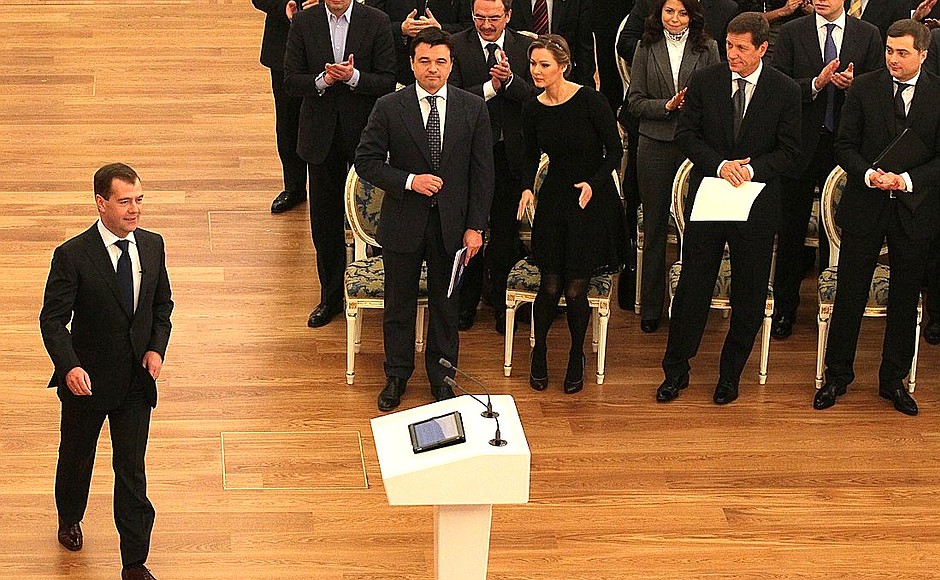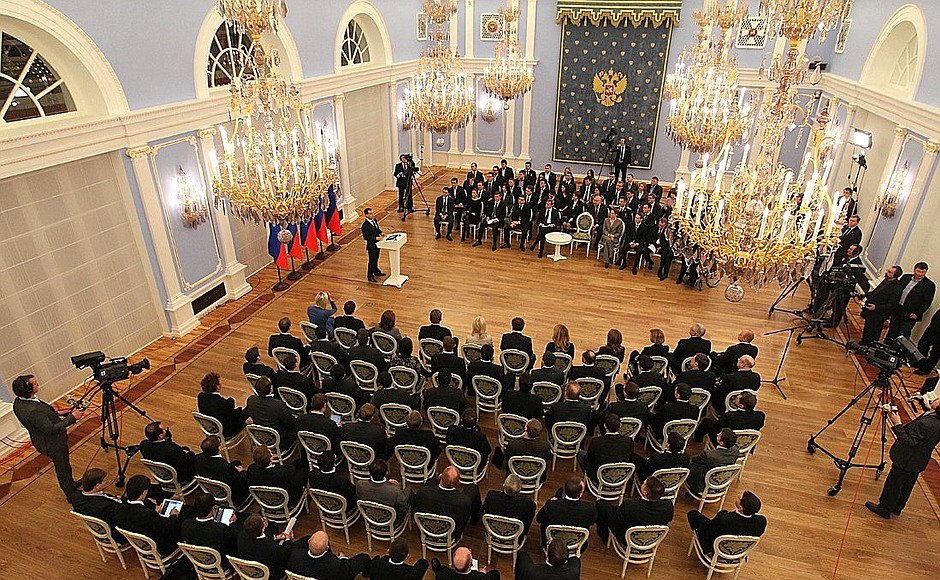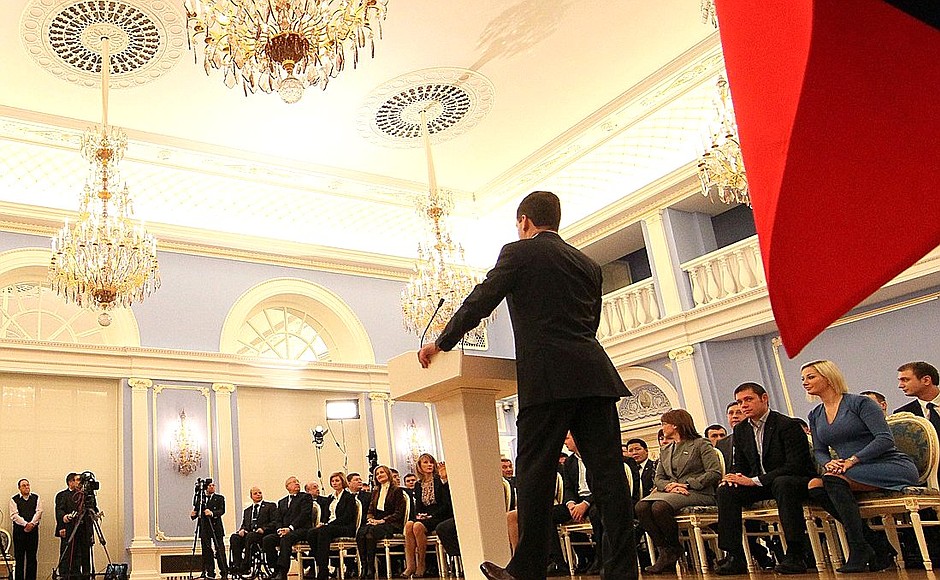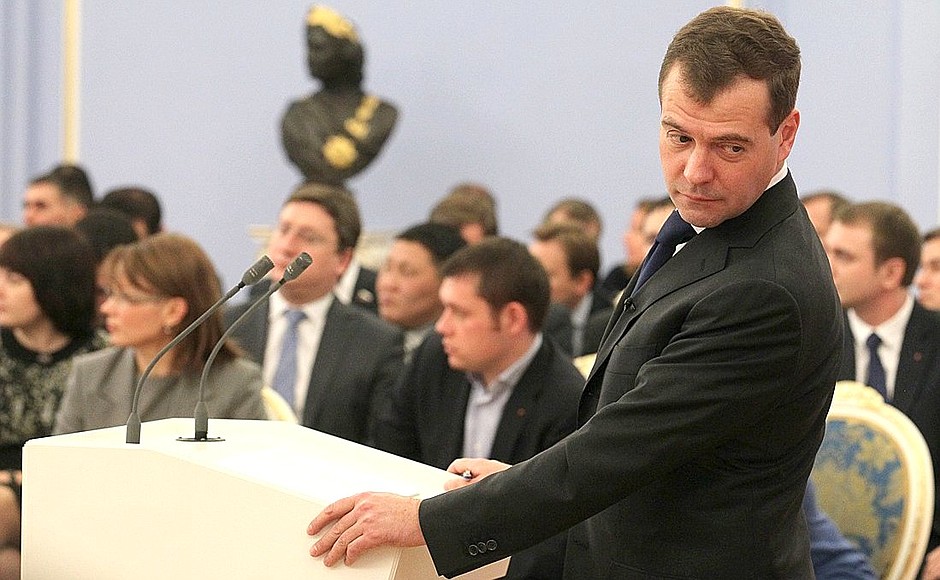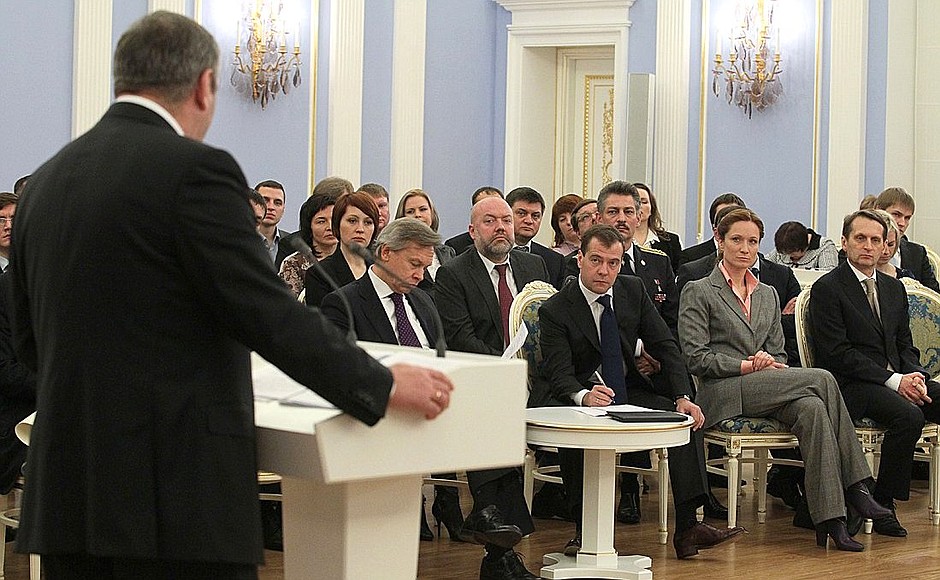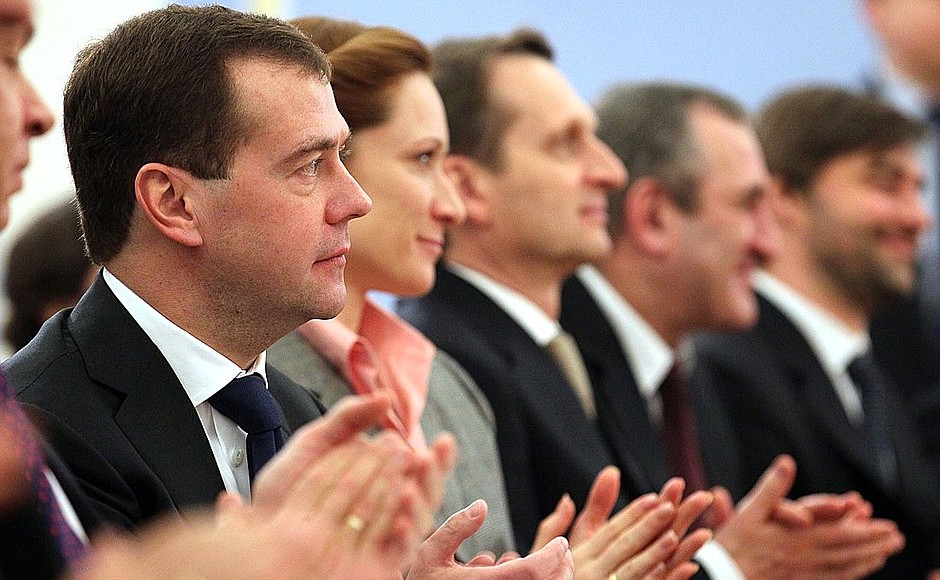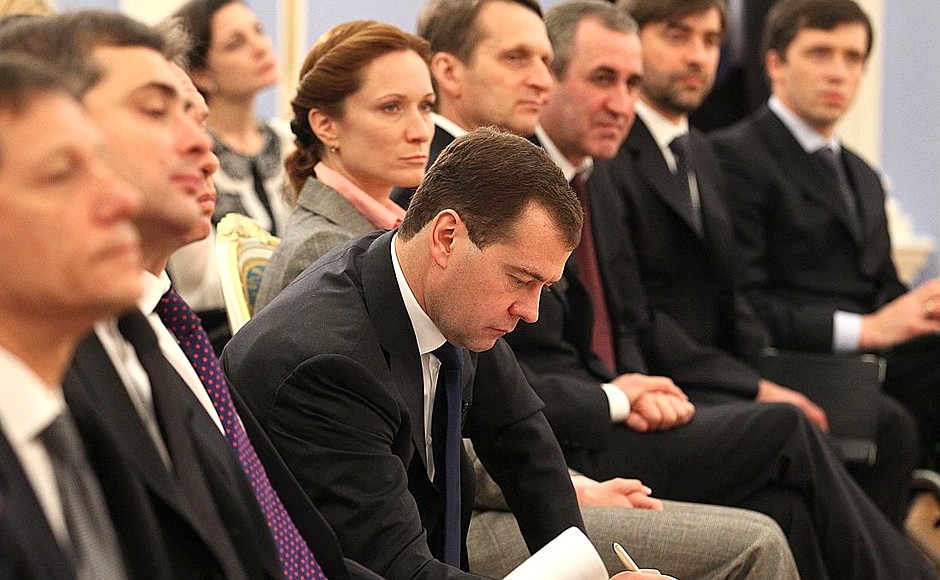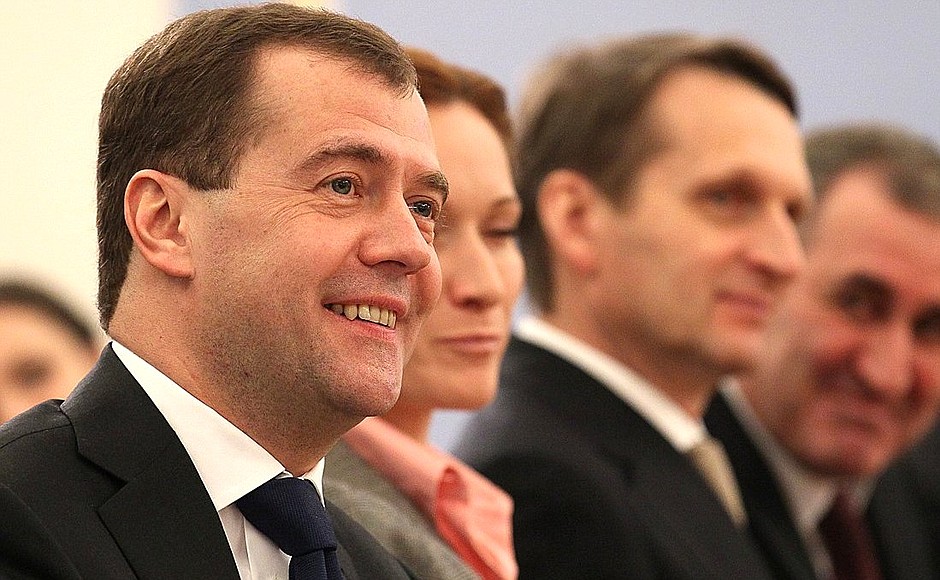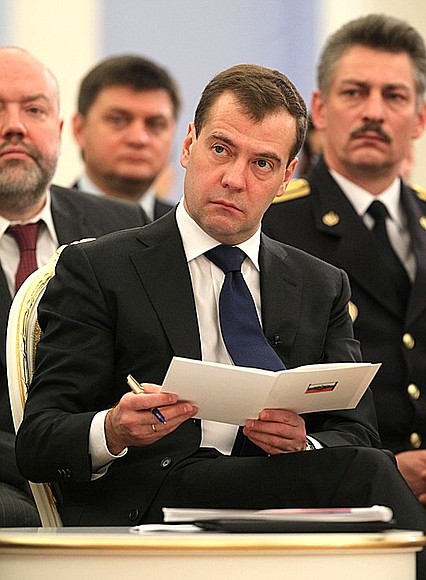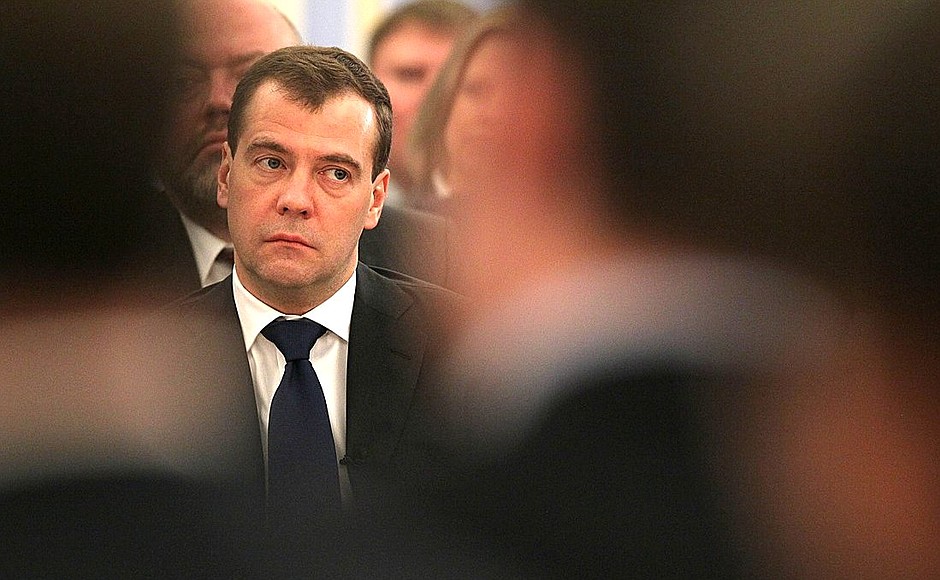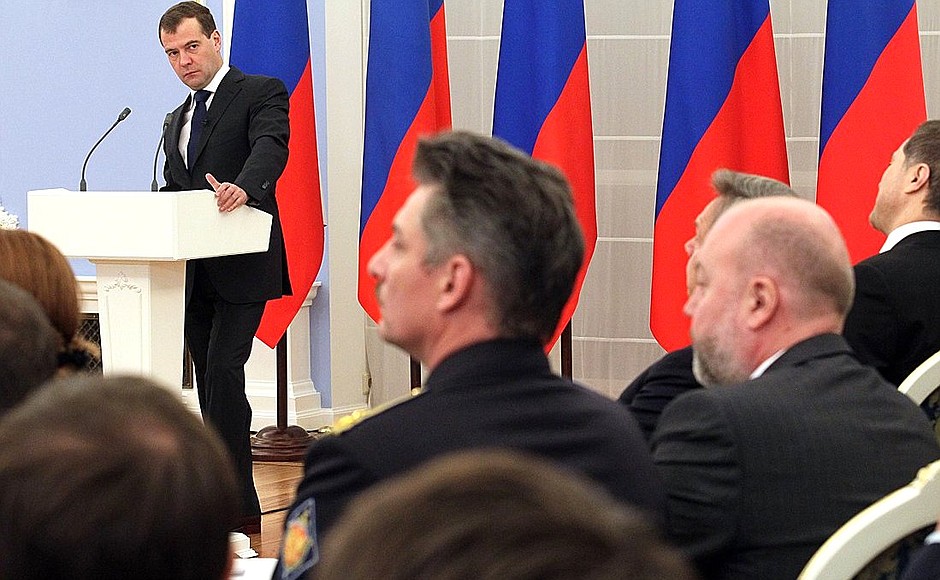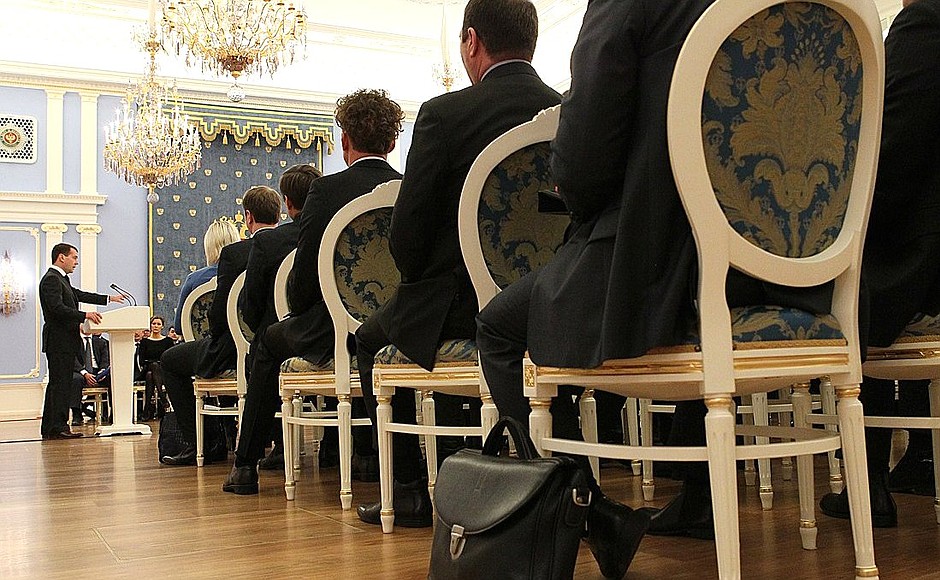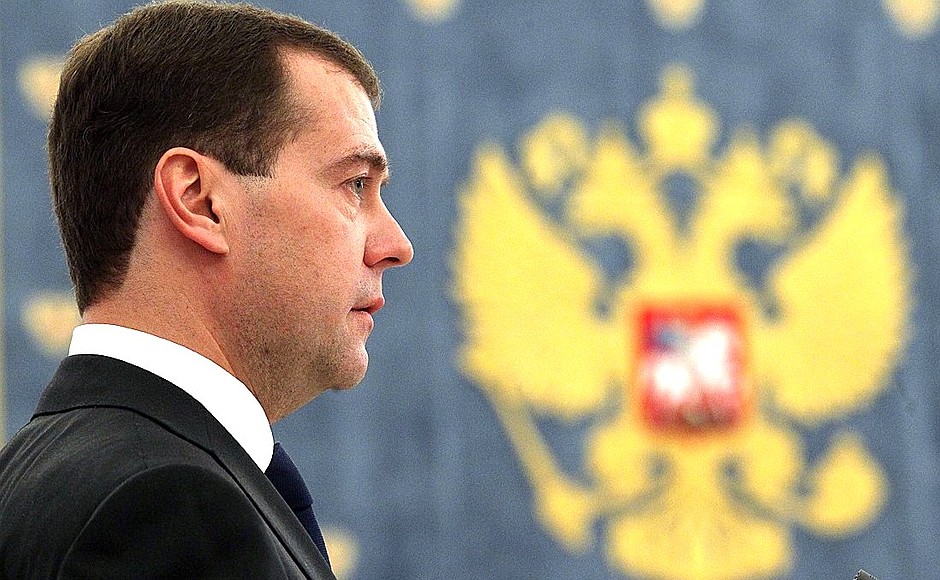President of Russia Dmitry Medvedev: Good afternoon, colleagues.
Dear friends,
I asked you here both with and without any specific reason, as they say. First, I want to congratulate everyone again on the victory in election to the State Duma. Tens of millions of people voted for United Russia which allowed us to obtain a majority with 238 seats.
I thank you wholeheartedly for all your work, very difficult work, whatever some may write or say, and which was conducted in extremely difficult conditions. I have already said this but I want to repeat it here. No doubt winning power is sometimes much easier than holding onto that power by gaining true respect. The fact that we did this is absolutely to your credit, that of everyone in this hall, and that of a huge number of party members and party supporters, who are not present here today but who have contributed a lot to our victory. Thank you very much.
The victory, of course, is a shared one, and in general our people used their votes to comment on the party’s performance. But this victory is also a token of their trust, trust in the future, in the forthcoming five-year State Duma session. We must do everything to show we deserve our victory. The work will be difficult, and there will be a great deal of it. Working conditions will become significantly more complex. But I think this is good for both our party and our society. Our life and our democracy are becoming more complex and multidimensional. It is only in competition that interesting ideas are born. Only they can allow us to accomplish a wide range of tasks.
How I perceive the current situation, my personal feelings, what I suggest doing in the nearest future and in the medium term, if the party keeps its position, if we can ensure victory of our candidate — then in the longer term: all these are things I would like to talk about in my Address [to the Federal Assembly].
The campaign to elect the President of the Russian Federation has been launched. Our task is to do everything to ensure that our candidate Vladimir Putin wins the election, that he wins properly, and vindicates the trust that he has benefited from for already quite a long time.
I'm sure this will happen. This will allow us to continue to modernise and ensure continuity: continuity in policy, in relation to social stability which was achieved with difficulty, and in economic growth. I hope that we can create the necessary conditions for improving our people’ quality of life. Doing so is extremely difficult.
These days we actually heard from the executives of a number of major economic organisations and international economic institutions that the world is entering a period of significant economic depression. All this will have its impact on our future work. We must be ready for this.
I talked about this at the party congress and would like to repeat it again here. At present no other party or political force has the same powerful human resources and the kind of experience that United Russia has. So in this situation the answer or, rather, the question is very simple: Who if not us? There is no other management team. And I say this not because we desperately want to manage things all the time, but simply because we should sure that our country passes through the crucible of these new trials in worthy fashion, just as we overcame the first phase of the crisis.
I will not talk much about the political situation, as I think you will say something about it. But in any case, in the conditions of evolving and growing political competition, United Russia needs to become more modern and more mobile in order to maintain its leadership. This is obvious. It must meet all of today's challenges effectively, it must firmly and efficiently protect the interests of Russia’s citizens in order to not lose their trust, and I am referring to interests in all fields, concerning all issues.
To do this, I will tell you frankly, we are to reconsider the party’s principles of operation. Moreover, we have to radically reform the party. This is nothing abnormal as every political force is renewed at some point. Strictly speaking, any political party in developed democracies is updated along these lines once every 10 to 15 years. I think it is now time for this, and you feel it yourselves no doubt. We need new ideas and we need new names, and we should certainly be open to cooperating with all social forces and smart people who are engaged in our country’s fate.
There is one topic I wanted to touch on at the end. We must all become more responsible as party members. That is why I think the leadership of United Russia, its leaders, and the individuals on party lists in elections should all be members of the United Russia party, without exception. Only in this case will our citizens believe that the party is not just a vehicle for voting or a career step in the life of a bureaucrat.
Party members must be genetically connected with their party, they should live the interests of our citizens, participate in all the party’s endeavours, not just formally attend some events, and associate the party with all of their hopes. But not just hopes, they must also share all political risks with the party. If the party’s fortunes are rising, everybody is happy, but if its fortunes wane the political risks must be borne by all: both the leadership and the party members. Only in this way will the party be an effective force. And I'm sure that this is the main condition of all our future victories.
* * *
Friends, if you permit, rather than answering each person specifically, which would make for a complicated dialogue, I will comment on a number of issues and at the same time answer the various questions you have raised.
Yes, we won the election. But at the same time, we all know that this victory did not come easy. To be honest, a lot of people, a lot of party members and our supporters and sympathisers, thought at the start of the campaign that it would be an easy road. I did not have this sense of things being easy, not that that matters now, because any political battle is never an easy thing and always comes with its share of problems. United Russia, I remind you, was taking part in parliamentary elections as a political party for the third time now. That is quite a long time: eight years plus another five years now – this is significant length of time.
But as I have said already, I do not see anything unusual in this. The various calls about this being a disgrace, a monopolisation of power, and something everyone is fed up with might be fair in one sense, but are unfair in another sense because all around the world at different moments and situations in history particular political parties have held power for long continuous periods. Look at Europe, for example, Germany, Britain, and a number of smaller European countries too. That’s not to mention Asia-Pacific region countries. But nobody holds this against them, though of course their domestic oppositions also tell them they’ve been around for quite long enough now. Therefore, there is nothing unusual in this situation.
The issue today is not this, I think, but is a different problem, namely, a gap that has emerged in relations between the different social groups. This is probably what should be of uppermost concern to the authorities in general and to United Russia, as the party that is once again taking the responsibility of power upon itself. We must stop this gap from growing precisely because our task is to unite the entire country and because we are responsible for the state of affairs in the country today.
We realise that people have different hopes and expectations, and that not all feel these hopes are being fulfilled. I have often asked myself, what goes through voters’ heads when they come to the polling station, what motivates their choice, what do they recall? They no doubt recall of course the faces of this or that leader, liked by some, disliked by others – such is the way of life. But what goes through their heads when they make their decision? As someone who has been involved in government for quite a long time now, I feel like saying to them, “Look at all we’ve accomplished so far. Look, we’ve done this, we’ve done that.” This was what we built our election campaign around, and we were not lying, we told the truth, for we really have accomplished much, more than anyone in the history of our country. In modern Russia’s relatively short history, no one has achieved as much as we have.
But is this what people remember? No, people never, or almost never, look back at where they were 8–10 years ago and compare it with today. People compare themselves in specific ways to others, thinking, “He’s better off, earns more money, gets treated more fairly, has different political demands that have a hope of being satisfied, while my demands go ignored, I get ignored, and there is no political force that will stand up for me.” These are the kinds of things that go through voters’ heads as they make their choice, these and more prosaic things such as “give us more money,” which is also quite understandable and natural of course. I think we must realise and remember this.
The result is that our parliament will have a more complex makeup this time, and we have obviously come to a new stage in our political system’s development. We must not close our eyes to this, for it has already begun. This is not the result of meetings and demonstrations, which are just the surface froth, if you will, the outward sign of people’s discontent. This has happened because the old model, which we defended and which served our country faithfully over the last years, is in many respects out-dated now and in need of renewal.
As a responsible party, a party that today has taken on the reins of government, we must take the lead in declaring the need to change this model in order to guarantee our country’s dynamic development.
We have analysed all of these events and their outcome, analysed what brought people out into the streets to express their view of the election and the authorities. I do not like attempts to paint things in black and white and I think we should avoid putting things in these kinds of simplistic terms. The people in the street are voicing not the views of the United States Department of State, of course, but their own views – the views of our public. The authorities must show responsibility and recognise clearly that these are our people’s views. They form these views for a variety of reasons. Sometimes their discontent is a reaction to blatant insolence on the part of the authorities, sometimes it is prompted by unfairness, injustice, and in other cases it may arise from mistaken notions (this happens too), or is influenced by various arguments and even simple propaganda. But whatever the case, these are people’s views and we must treat them and their views with respect.
As for the US State Department – it is not under our authority. I spoke yesterday with the President of the United States. We talked about our work over these last years, about what we have and have not achieved, and about the ‘reset,’ or the ‘overload’ as it was mistranslated at one point on the famous button, about whether it has produced the hoped-for results. I must say, on the human level I have good relations with him and we understand each other quite well, but I nonetheless had to make one point clear, namely, they in America are entitled to view our election any way they want – this is their choice, but it does not have any particular meaning for us. We are a strong sovereign country, a big country, and whatever views one holds, they should be expressed in proper fashion. It is one thing to say after the votes have been counted and the decisions announced that you are concerned or you do not understand the situation, but it is quite another thing when the very next day we hear old refrains in the best traditions of the Cold War era. This is certainly not what the reset was supposed to be about. I said all this to my colleague yesterday. No matter what the democratic feelings that motivate such statements, no matter whether they come from the heart or any other organ, they are unacceptable and we will not just let them pass in silence.
Reflecting further on the events that have taken place, meetings and demonstrations are all manifestations of democracy, and this we understand. We realise that society has become more active. It has matured and reached this point, and this is a normal process. The main thing is to keep this development going within the limits of the law, and then it will indeed help our country to advance along its modern development road.
This is a culture we all need to learn, the people who come out to protest included, and people will continue to come out to protest because this is life, and people will protest against our party, against the State Duma, against the President and the Government (as happens all around the world). And the police need to learn this culture too, learn to respond appropriately. This is a process that we need to see reflected in our level of political culture. This is the most important thing.
Look at the footage we saw on the TV screens yesterday, for example, our own images, images from other countries, and feel the difference, look at what we cannot and absolutely must not allow to happen here.
Everyone has been talking about our beloved internet. I think the internet is a protest voice by its very nature, and it is such not just in Russia but all around the world. This is normal too, but the problem with the internet in Russia is the appallingly low level of political culture we see there.
You don’t have to like the authorities. This is normal. And you need to be able to say to the authorities what you think of them. I would not ask that we all follow the biblical commandment and love one another, but I think that we should at least respect one another and not demand that someone be immediately taken out and shot. And yet, these are the kinds of calls you find in the internet. It's not just about the authorities, or the emotions of the authorities, United Russia, or anybody else. Just look at how people treat one another, look at the things they write to each other – it’s catastrophic. If you take a look at the English-language internet you’ll see that the notorious four-letter word is a rarer sight there than in our internet.
This indicates a different level of discussion – even when you do not like or understand your partner in dialogue. Unfortunately, this is not something that can just happen overnight. We are still in the process of growing up.
Another very important issue is that under no circumstances can we allow a de-legitimisation of power. I am not saying this because I embody this power today, I, the Government, the newly elected State Duma, the Federation Council, and the courts, but because if this were to happen it would mean only thing for our country – its collapse. Everyone knows full well from their history textbooks what happens to a Russia without legitimate authorities – we end up with 1917.
Protests are a normal part of life, and this includes political protests. As I just said, we had a model that served us well for a time in our country’s development, but its time is over now as we move on to the next stage. As a responsible political force we must recognise this. We are not blind or deaf, and we must be the ones to begin the process of change. We are responsible for the situation in the country and we thus need to start the process of political transformation. Only by doing this will we show that we are responsible people who have accepted to take on this heavy burden, to bear this cross. We must do this at the call of our conscience and on the basis of cool reflection, and not because we are forced to. We will not change under duress, change because we are forced to, but will change of our own will for the reasons I just mentioned.
The recent proposal made by Vladimir Putin, our presidential candidate, on changing the procedures for appointing regional governors is one such step. It would see a transition, or a return, if you will, to direct elections based on parties’ proposals. There will be other steps too, and we will most definitely make our proposals known.
I agree with what my colleagues said about the State Duma and the way it will work. We have the majority and this is something we have no need to be shy about. We won this majority in completely constitutional fashion, and there should be no doubt about this. But we must not let it go to our heads, must not turn our backs on those who form the minority. Regrettably, it did sometimes happen in the State Duma that people grew giddy with their own success and thought it possible to wield power without consulting with anyone else. Sometimes this happened, and it was usually well-intentioned in the sense that people thought, “This law we are passing is good and right and the result of thorough reflection, but others are trying to put spokes in our wheels. Remember what the State Duma was like in the 1990s, when it is was impossible to get any law passed.” This is the truth of the situation, and such thinking is fair, but you still need to consult, you still need to discuss all the issues. The Duma will be a complicated one, but this is good in a way because it means a better quality of legislation. It means that you will engage in debate, and it is out of debate that the truth is born.
Some of our colleagues raised another matter too, something we have also been reflecting on a lot of late. People ask us why we are so slow to react, why we are so inert and weak, why we do not behave more like the opposition. The answer is very simple. To become as nimble and sharp as the opposition you have to become the opposition. That’s all there is to it. There’s no other recipe. Of course I am not suggesting we voluntarily give up power. What we need to do is try the opposition role on for size, its skills, toughness, and swiftness of reaction, and every single day put ourselves in their place. We hold power today after all, but this is not guaranteed for decades to come, and this will not happen. We always need to be ready for defeat too, because only by being prepared for defeat can you be ready and able to win.
I will not talk much about our future plans today. Of course I am very pleased that we have signed the agreements that will take our integration projects further. I make no secret of the fact that I am pleased this process speeded up during my time as president. At one point I did indeed suggest to my colleagues that we actually take the construction we’d been working on all this time and put it all together, and the result has been surprisingly good. I am very pleased to see this direct result of our work together.
Regarding our relations with other countries, with the United States, for example, I already spoke about this. Whatever the case, we will not allow ourselves to be intimidated or misled. We need to set clear objectives for ourselves, set a clear course, but at the same time, we should not start acting haughty and say that we can develop on our own, will follow our own road, and do not need the help or involvement of any other country. We have followed these principles over the last years, but politics always needs to take the specific circumstances into account too. No matter how friendly the relations we have with other countries, if our voice is not heard, we will respond, as I was forced to do on November 23. There is no offence meant in this; it is not directed against Obama, but simply against the particular policy that the US leadership has decided to follow. If they continue to ignore our concerns, we will be forced to react. If they listen to our concerns, we will also change our behaviour accordingly. This is what practical politics is about.
Concerning the proposals on decentralisation, when it will happen, and what it will look like, we are still in the process of holding discussions and consultations and I do not want to jump ahead and give all the details so as not to encourage overly high expectations. We are taking a balanced and rational approach: we will not give the regions responsibilities they cannot actually carry out, and will not give the municipalities tasks that are not backed up with the money needed to finance them. We will look for new financing sources to support the new powers the regions and municipalities will receive. Frankly speaking, I talked with the new finance minister about this issue yesterday, and I think that perhaps three-five years will go on putting this new system in place. We will do this in stages, because as I said at the start of our discussion today, to use the words of Christine Lagarde, the world has entered a great depression. This is not just a fine turn of phrase, but is the reality. The crisis looks to be upon us. Actually, it is not a new stage, but rather a continuation of the previous crisis, only in a new form.
The fight against corruption was one of the things I have worked hard on over these last years. I am very pleased that I took the responsible decision of taking this issue out into the open and tackling it up front. I have spoken about this before. People tried to talk me out of it, saying that there’s no way of ever vanquishing corruption. It is true that we have not vanquished corruption. But we never claimed to have done so. What we have done is to pass the laws that will help us fight it.
We hear the reproach that our own party is full of people guilty of corruption. Yes, we have enough such people in our ranks. Why is this so? This is because our party counts many members of the elite among its members, people from the regional elite, the municipal elites, the federal elite, and it is among these groups that the most notorious and headline-making corruption scandals occur.
We should not shy away from this issue and this reality: any party that holds power is always more under threat from such things and is under much closer scrutiny.
We already discussed the possibility of making greater use of confiscation of assets as an anti-corruption measure. This is not so difficult to implement. The thing was that at one point, our lawmakers, probably influenced by criminal law thinking, concluded that confiscation as a penalty was a relic from the Soviet legal system and that we cannot deprive people of their property. But in reality, if other measures do not work, confiscation could prove an effective instrument.
Monitoring expenses is also a possibility. The main thing is to follow common sense, examine the international convention in this area, decide exactly which kinds of expenses are to be monitored, and – I agree completely – define the group of people who will be subjected to this monitoring of their incomes. The group that we set was limited to the minimum of close family members (spouse and children still minors, while children already of legal age are treated as separate individuals). We could expand this group, but the question is how much strength and will we have for this task.
I agree with what was said on the ban on civil servants being founders of companies and on lack of sanctions in these cases. I have often received information that citizen so-and-so is a founder in a joint-stock company and that even though this violates the civil service regulations, it brings no penalties. In principle, this is a moral regulation, but it could be transposed into the legal context. Just thinking here on the spot, one possibility would be, say, to make it a legal rule that if an individual should have declared his participation in a company but did not do so, or decided to enter a commercial venture while engaged in civil service, this would automatically raise the question of loss of confidence in the particular individual in accordance with the civil service regulations. It would then be for the individual’s employer to either fire him, or to declare openly and publicly that, yes, this person is indeed involved in this or that commercial venture, but I wish to keep him on. The responsibility would then lie with the employer.
Regarding the Anti-Corruption Commission, I can say only that this is a matter for the State Duma’s leadership to decide. My view is this: friends, you must take the initiative and not leave this issue for the opposition, because you know full well that they will put it to the greatest use in their own favour. You must make sure that United Russia leads the anti-corruption campaign in the State Duma, otherwise the criticism about the number of crooks and other undesirable elements will only keep increasing. This is an issue we must tackle ourselves.
Regarding the internet, it was suggested that we beef up the party’s presence there. You know, I do not really believe in a ‘party’ internet. I think that most of you probably agree. Of course the party should have its own site, and it should be a good and interesting site. The regional branches should have their own sites too. All of this is useful and needed. The regional governors should have their own sites too. On the other hand, soon enough we will probably see that not all of the regional governors are members of United Russia. This is normal enough. In such cases we will whistle and shout and call out, “Look at what they’re doing, look at how they’re behaving, look at the mess they’ve made.” Actually, this will have its advantages for United Russia, because at the moment everyone points the finger at United Russia, but these developments will give us that chance to point the finger at others for a change. This is all normal and positive.
As for the internet, I think it can serve us not through the use of any kind of administrative resources, but through the party's own real influence. Simply, this is something that takes time to build up. We all need to relax, take a breath, and move on to the next stage in developing the party itself. Everyone will settle down, the emotions will fade, and we will be left with the work to do, the tasks ahead, and this is what we will be judged by.
One last thing about the internet, of course we are not going to meddle with it, limit it. We are a modern country and are not going to interfere or shut anything down. No, let all those Twitters and so on keep working. Let everything keep working. I think this should be clear in everyone’s heads.
…Let’s be positive about the WTO. We took such a long time getting there after all. Yes, there are some problems, some difficulties, and there is still the ratification process ahead. I agree completely that we need to act in careful and considered fashion, but this is nonetheless a great victory, and we all realise that its opens up new competition opportunities for our economy.
We will continue to carry out children’s and social programmes. I will not go especially into the details of these programmes right now. This is a separate issue, a complex and very important issue.
Let me finish with a few words about the personal responsibility that each of us bears. It was not for nothing that I said in my opening remarks that we need to recognise and enter into the situation that the election and its outcome have brought our society and our party. No political leader has the right to turn his back on the party that brought him to power, if he came to power through the party system. This is unacceptable and simply not right. As far as I am concerned, as I said in my opening remarks, all leaders should be within their parties, and there should be no doubts or exceptions here.
One final thing, I think it is time to relax in the direct sense of the term. Yes, we still have big events ahead, difficult events and many trials to come. Our society has entered a much more active phase. The authorities’ task now is to ensure that society keeps developing, but in accordance with the law. As far as the parties are concerned, it is time to relax in the sense that it is time to review events and draw some conclusions, whether positive or not so positive, and time too, to start looking to the future.
As the party members on the ground, the people in the regions, I ask you to take this message back and pass it on to all our colleagues, supporters and everyone close to us.
Everything is fine, everything is ahead of us now, and all will turn out well. Victory will be ours!
